Freeman Center for East Asian Studies Celebrates 20 Years
 |
| The Mansfield Freeman Center for East Asian Studies Celebrates its 20th Anniversary with the Freeman family from 11:30 a.m. to 1 p.m. May 24. |
| Posted 05/15/08 |
| What began in an empty, shingle-style home on the edge of campus 20 years ago has prospered into a central hub for East-Asian-focused lectures, tea ceremonies, exhibitions, student performances, and programs to introduce school-aged children to new cultures.
This year, the Mansfield Freeman Center for East Asian Studies celebrates two decades of existence. Wesleyan will honor the Freeman family for their unique legacy of excellence during an open house and reception May 24. The Freeman Center is one-of-a-kind in this country, explains Vera Schwarcz, the Mansfield Freeman Professor o East Asian Studies, professor and chair of East Asian studies and director of the Freeman Center for East Asian Studies. The Freeman family has enabled us to become a central focus of learning activity for Wesleyan and the larger community through out varied offerings. Schwarczs friendship with the Freeman family dates back to the late 1970s, when she and Mansfield Freeman 16 brainstormed the idea of creating a small-scale academic program centered on language and history. Freeman had lived in China around 1920, and had developed a deep interest in U.S. and East Asian relations. Mr. Freeman believed that in the past, this country had frequently blundered in its relations with Far Eastern peoples, Schwarcz recalls. This arose from a lack of understanding of the feelings and attributes of people who spoke a different language and had been nurtured under philosophies different from ours. By the mid 1980s, Freeman already established the Mansfield Freeman Fund, the Annual Freeman Lecture and a scholarship for summer language study at Wesleyan. In 1986-87, he donated additional funds, which led to the establishment of the Mansfield Freeman Center for East Asian Studies. Located at 343 Washington Terrace, The Freeman Center was renovated to include office space, an exhibition gallery, a research library, seminar room and reading room. The space quickly became host to lectures, programs and events, archival collections and exhibits. A Japanese garden and tearoom were added in the mid-1990s. Most importantly, the Freeman Center also is the home of the undergraduate academic program focused on the study of China, Japan and Korea. The Mansfield Center is a big draw, and it attracts students from all over the world to Wesleyan, Schwarcz says. Students want to come here, and we get the best of the best. Mansfield Freemans son, Houghton Buck Freeman 43, was raised in China and fought in World War II in Fu Chow, China against the Japanese. Throughout his life, he became heavily involved in Chinese and Japanese economics, and like his father, he too made an extraordinary commitment to the Freeman Center. With additional support by Buck Freemans wife, Doreen, Hon. 03 and his son, Graeme Freeman 77 the East Asian Studies Program has blossomed to a center of cultural inquiry. In 2006, the center received a new west wing addition dedicated to the memory of Mansfield Freemans wife, Mary Houghton Freeman. This space, which overlooks the Freeman Family Japanese Garden, is used for luncheons, programs, performances, lectures and classes. Through the center, we have galvanized interest in East Asian culture at a time of growing concern with international education in relation to improving global understanding, Schwarcz says. Two decades after inaugurating the Mansfield Freeman Center, we are finally able to truly honor our founders vision of mutual understanding between United States and Asia. The open house and reception will be held from 11:30 a.m. to 1 p.m. May 24 at the Center for East Asian Studies. A colorful, photograph-rich booklet on the 20-year Freeman legacy will distributed at the event. A complete timeline of the Mansfield Freeman Center is online at www.wesleyan.edu/east/mansfieldf/mansfield.html. |
| By Olivia Drake, Wesleyan Connection editor |

